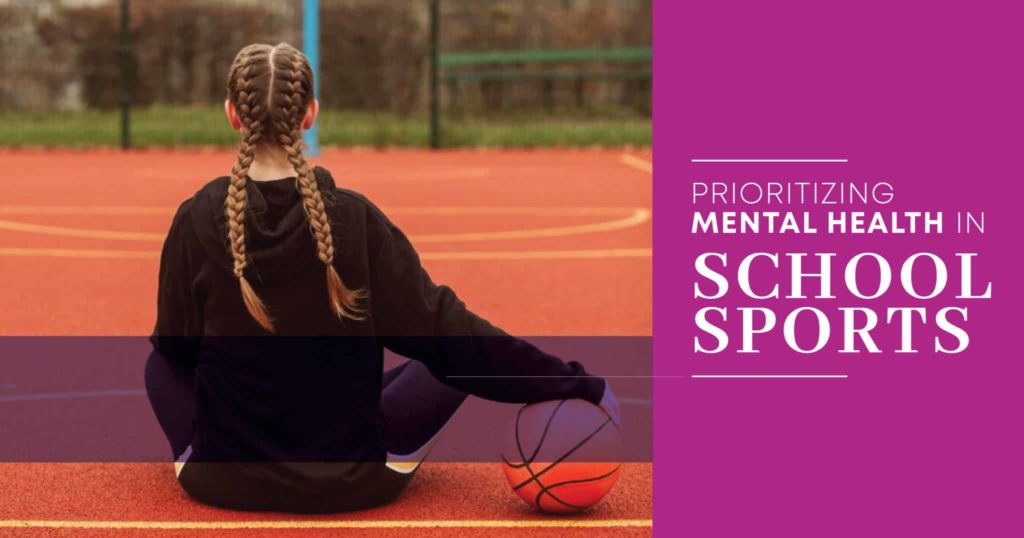Among young people in the United States, there is a crisis. The pandemic has taken kids and teens out of school and away from friends for years, with tremendous consequences. According to experts, children and teens are experiencing soaring levels of anxiety and depression.
In the fall of 2021, the American Academy of Pediatrics and the American Academy of Child and Adolescent Psychiatry declared a national emergency for child and teen mental health. They called for more funding for mental health resources and other actions, including integrating more mental health care into schools and primary medical care. The organizations also pushed for more community-based systems to help people connect with treatment and programs.
One area that parents, educators, and others in communities can pay attention to, as well as general mental health among young people, is mental health in sports. Sports can be good for young people’s mental health, but there are caveats. Parents, educators, and coaches must realize the importance of mental health awareness in sports at a time when children and teens are already suffering enormously.
Mental Health IS Health!
We know that mental health is just as important as physical health, but many parents still don’t react as quickly to signs of mental issues in their children as they do to physical fitness. Mental health is not only as important as physical well-being but also affects it. Untreated mental health problems can impact self-esteem, learning, and socialization and negatively affect child development in ways that last for a lifetime.
Making mental health services and mental health treatment available to young athletes for mental health conditions and concerns is critical going forward. It’s something to look at year-round, not just during specific events like Mental Health Awareness Month. Having treatment options available, whether someone is experiencing a mental health crisis, is at risk of suicide, has a particular mental disorder, or needs some additional support during emotional or mental health challenges, can be life-changing.
Increasingly, high-profile professional athletes have been working to raise awareness about mental health. Naomi Osaka is one example, she exited the French Open and cited her mental health struggles, just like Simone Biles. Michael Phelps has also been vocal about his mental health difficulties, helping to shed light on these psychological issues in athletes, as has basketball player Kevin Love.
The Growing Mental Health Problem in Sports
Children and teens are already facing stress in nearly every direction. There are traditional sources of stress, like relationships and grades, and there’s also social media, which means that young people often have no escape from stress.
If you add athletic participation in an environment that’s too pressuring or too competitive into a person’s life who was already feeling stressed, it can make everything much worse. Youth and teen sports can potentially lead to high mental and physical health costs. Sports participation and competitive athletes put so much pressure on young people to the point they feel like much more is riding on their athletic performance than it actually is, creating psychological concerns.
Athletes experience the same mental health disorders as non-athletes but have additional pressure on them, including intense training. Professional athletes comparatively tend to have more resources available and at their disposal to deal with mental health issues, but younger athletes don’t.
- Among young athletes and non-athletes, some of the most commonly experienced mental health conditions include anxiety, generalized anxiety disorder, attention-deficit/hyperactivity disorder (ADHD), depression, and eating disorders.
- For female athletes, in particular, body image concerns and related issues often arise too.
- Added to those mental health risks are ones exclusive to sports. These include demanding physical training that can contribute to injuries, exposure to bullying within the sport, and pressure to use drugs that could improve performance.
- Athletes face a loss of identity when not actively involved in the sport, and sleep deprivation is also a stressor.
- People speaking out on the topic often describe the professionalization of youth sports and parents’ roles in adding to the stress their children are already feeling. For example, parents may pressure their young athletes to become college athletes, get scholarships, or constantly talk about them playing professionally in the future.
Could Early Specialization Trigger Issues Later?
Even though sports for young people can create stress, that doesn’t mean they’re bad—quite the opposite. When young people play sports, they tend to have better physical health, have lower rates of obesity, have better grades, and be less likely to drink or use illicit drugs.
There have to be boundaries, however.
Some experts feel one idea to reduce youth sports’ adverse effects is to stop having kids specialize in one sport early. The concept of being elite athletes shouldn’t be pushed on kids at such a young age.
- When kids from an early age participate in multiple sports instead of just one, it reduces the risk of overuse injuries and helps develop broad motor and movement skills.
- When kids play different sports, they experience other peer groups and types of collaboration.
- When young people specialize in an individual sport, there’s much more pressure for them to attain an elite level of performance.
- Specializing in one sport can also limit a young person from participating in other activities and developing relationships with peers outside of their sport.
If a child or teen is going to specialize in a sport or participate in a more competitive league, parents should ensure that they keep their participation at healthy levels. Parents should look for signs their child is stressed or overwhelmed and regularly check in on them.
What Else Can We Do To Help Teen Mental Health?
Along with understanding the importance of mental health awareness, everyone has a role in dealing with issues that young athletes may face.
Overtraining is something that has to be avoided. Parents should ensure their children aren’t overtraining because not only does it cause fatigue and other issues but it can increase the risk of injury. Being injured is a specific trigger for mental health symptoms in a lot of athletes.
Both athletes and coaches can take on a mindset of focusing on skills development and the fun of playing rather than who wins.
Coaches can start to integrate strategies to help players manage their competition stress.
Things parents can do to help their children and teens’ mental wellness, whether they’re an athlete or not, include:
- Create safe spaces for your child or teen to talk to you. Don’t force it, but let them know you’re available.
- Make sure your child is getting downtime. There need to be times in their lives when nothing is scheduled, and they’re free to do what they enjoy.
- Make sure your child is getting enough sleep.
- Keep in touch with teachers, coaches, and other significant adults in your child’s life. You need open lines of communication with these people.
- Pay attention to your mental well-being and how you might react to your child playing sports. You have to model the behavior and attitudes you want your child to have.
- Know what mental health symptoms and red flags to watch for.
Mental Health Treatment for Teens in Southern California
There always has to be recognition from everyone involved that playing sports should be enjoyable and ultimately feel mentally healthy. If it doesn’t, it’s time to take a step back and evaluate what’s happening.
If you think your child or teen is struggling with their mental health, please reach out to the clinical team of mental health providers at Hillside Horizon for Teens by calling 855-746-8378 to learn more about therapy and treatment options available in Southern California. Our mental health professionals can help your child or teen deal with conditions like anxiety disorder, bipolar disorder, and other mental health concerns.




